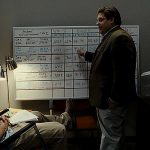Moneyball – 2011
This is the second time I have seen this movie, and I liked it just as much this time as I did the first. Now, I’ll say, right off the bat, that though I liked the movie, I shouldn’t have. I’ve just never been a sports fan, and baseball has never really been able to hold my interest. Moneyball was all about baseball and nothing else. Or was it?
The film starred Brad Pitt, Jonah Hill, and Philip Seymour Hoffman. There was only one other actor in the supporting cast I recognized, and that was a very young Chris Pratt. So really quickly, here is a synopsis of the plot, because it wasn’t very complicated. The Oakland A’s are in a slump and lose three of their best players to other teams. On top of that they have only a fraction of the funds available to other professional ball clubs.
Pitt played Billy Beane, the team’s General Manager. Hoffman played Art Howe, the Manager. Beane knows that the traditional criteria for hiring new ball players isn’t working so he brings in a new assistant, Yale economics graduate, Peter Brand, played by Hill. The two make hiring decisions based on player statistics, something which had never been done. Everyone thinks that their new system will fail miserably because they hire has-beens, injured players, and players with attitude problems. But despite Howe’s lack of faith in the system, it has surprising results, and the A’s start winning game after game. They surprise everyone by going on to have a record-breaking twenty game winning streak, and though they come close to making it into the World Series, they ultimately fail. Beane is offered an obscene amount of money to work for the Red Sox, but turns it down because he is loyal to the A’s, and wants to stay in California near his daughter.
That is pretty much it. But then, what made the film so good? First of all, like most sports films, the team we are following is an underdog, and who doesn’t like rooting for the underdog, especially when they start to win? Second, the three lead actors are all very good at what they do. Third, the movie wasn’t really about the game. It was about a man who believes so strongly in what he is doing that he is willing to risk everything to change the very nature of the game. I wasn’t rooting for the A’s because I like the A’s. I was rooting for them because I wanted Beane and Brand’s system to succeed. I wanted them to prove all the doubters wrong.
Aside from that there wasn’t much else to the film. But it was enough. It was very enjoyable to watch. There were a few interesting subplots that kept my attention, like the fact that Billy used to be a baseball player, himself. He was shown to have a lot of promise, but just didn’t have what it took to be a first string player. It was there to prove the point that the old way of filling the roster of a ball team, which was based on a player’s age, appearance, and other superficial things. Beane and Brand’s main opponent was the Head Scout, Grady Fuson, played by Ken Medlock.
The subplot that concerned Howe was interesting, and I even learned a little about the structure of the Management staff for a professional ball team. The General Manager is responsible for hiring, firing, and trading players. He is in charge of the scouts, and is answerable only to the team’s owner. The Manager is responsible for managing the team with the players given to him by the General Manager. Beane could hire Scott Hatteberg, played by Pratt, to play first base, but if Howe didn’t want him in that position, he could put Carlos Peña on First. Beane’s solution was to trade Peña to another team, forcing Howe to put Hatteberg on first base.
I liked Pratt, who really looked the part. I also liked the relief pitcher Beane hired, Chad Bradford, played by Casey Bond. There were a few other actors who also did a good job like Nick Porrazzo playing Jeremy Giambi, Robin Wright who played Beane’s ex-wife, Sharon, and Kerris Dorsey who played Beanne’s daughter, Casey. Everyone did a fine job. Even the film’s director, Bennett Miller, did well.
But here is a bit of trivia that I found in my research which throws a shadow of doubt over the entire plot of the movie. Does the system really work? It was based on the writings of a baseball statistician and historian named Bill James. It was his system that Billy Beane and Peter Brand, who was really a man named Paul DePodesta, were using. Many baseball critics call the A’s turn-around and winning streak mostly luck. They say that certain players contributed to certain wins, but many of the twenty games were just good luck. But I have to disagree. The implementation of James’ system and the A’s winning streak happened during the same season. That is too much of a coincidence. But I’ll admit that there was a certain amount of luck involved. There had to have been. So, I have to conclude that the success was due to both luck and the system. Either way, the movie was mostly historically accurate, and was very entertaining to watch.








